- Home
- Regan Walker
The Holly and the Thistle Page 3
The Holly and the Thistle Read online
Page 3
“It is,” she agreed. “Would you like some?”
“That would be most welcome.”
He rubbed his palms together as if trying to warm them. Tonight his broad shoulders were clothed in a dark blue superfine coat. Underneath he sported a bronze brocade waistcoat and dark brown breeches, and the light of the fire brought shades of sunlight to his rich chestnut hair. She was thinking entirely too much about a man she would soon send away.
Notwithstanding her plans to consign him to the ranks of her former suitors, Emily invited the Scotsman to sit on one of the sofas flanking the fireplace. Nodding to her waiting footman, she saw them promptly served up two cups of the aromatic liquid. There was nothing better than hot wassail to warm one on a cold December night.
She stole a glance at William over her cup. “I received your flowers.” She gestured to the bouquet of narcissus and roses standing on the far table in front of the bay window. “Very thoughtful of you.”
“I was hoping they might keep my face before you and perhaps help you to reconsider my invitation for a ride in the park.”
Emily had suffered no trouble bringing his handsome face to mind. None at all. But she would not encourage a ride alone in the park.
Sounds of revelry carried into the room from the street, distracting Emily from her response. The mummers were about tonight.
“What’s that?” Mr. Stephen said.
“Christmas revelers, I suspect. Mummers. Actors. They perform for coins, food and wassail.” The butler appeared as if summoned, and Emily made a sudden decision that surprised her. “Show them in, Harrison. I think our Scottish guest may like to experience this tradition.”
Mr. Stephen smiled in agreement.
The entertainers piled into the parlour amidst loud bursts of song and laughter, clothed in outrageously bright colors with ribbons dangling from their sleeves and gilded and spangled caps on their heads. When Emily and her guest rose to greet the young men, the leader bowed and extended his hand to indicate himself and his noisy friends.
“We bring you Christmas cheer, my lady, my lord, and the tale of Alexander and the King of Egypt. I, Alexander, will introduce the players.” Whereupon the young man described—in rhyme, of course—a “noble king,” “a prince,” and “a doctor good.”
Emily and Mr. Stephen reclaimed their seats and settled in to watch. She could see the Scotsman was enjoying the performers and their exaggerated roles. He laughed with their antics, a great unrestrained laugh she’d never heard in any English drawing room. He was so full of life and so at ease with himself.
Soon there was more rhyming as Alexander continued:
“Room, room, brave gallants, give us room to sport,
For in this room we wish for to resort,
Resort and to repeat to you our merry rhyme,
For remember, good aim, this is Christmastime….
Step in thou King of Egypt and clear the way.”
The player who’d been introduced as the king then introduced Prince George, who spoke his own role:
“’Twas I that brought the dragon to the slaughter,
And I that gained the Egyptian monarch’s daughter.”
Alexander was having none of it, and he replied, along with many other words,
“But hold, Prince George, before you go away,
Either you or I must die this bloody day.”
Immediately after, Alexander and the prince fought with mock swords, clashing and bashing until the prince was wounded and fell to the ground. The king immediately called for the doctor. Much discussion was had about the remedies to cure the wounded prince—all in rhyme and all very humorous.
William laughed the whole while, and Emily could not help but laugh along with him. She found it warmed her heart to share this, the mummers’ merry-making with him. He gave her hand a squeeze, and his own was large and warm covering hers. The palm was calloused, the hand of a man who did not spend his days sitting around drawing rooms. She liked that about Mister Stephen: his outdoor, earthy smell and his rough exterior.
She must get control of herself. She was liking him too much.
Alexander took up his mock sword and fought with the king next, who was killed quite dramatically, his body sagging to the floor. At this point Prince George rose up from his wounded state and made the final speech, a grand commentary on behalf of all the players, which concluded the entertainment.
Emily and the Scotsman stood and clapped loudly. Mr. Stephen handed each of the actors a coin, and her footman served them wassail and cold meats and cheeses, having anticipated the young men’s desire for food. Soon the actors were sent on their way with wishes for a happy Christmas.
Emily closed the door of the parlour and settled on the sofa in front of the fire, a smile on her face. Mr. Stephen joined her, taking her hand in his. Why she allowed the holding of her hand, she could not say.
“I enjoyed that—all the more for sharing it with you, leannan.”
Emily was alarmed at this continued and increasing intimacy, and she rose to stand by the fire. “What is that name you keep calling me?”
“Sweetheart.”
“Sweetheart? Really?” Emily nearly choked on the word. That was something a man called his wife.
“It’s the way I think of you, Emily.”
“Surely not, sir. We are but recently acquainted!”
“I, on the other hand, feel as if I’ve known you for a verra long time,” he said. His Scottish burr had suddenly risen to the surface.
He rose and walked close to her, standing mere inches away. Their eyes locked. His hand reached out and his knuckles gently stroked her cheek. “I’ve seen the heather in your eyes on a hundred Highland hills. I’ve felt the beat of your heart when I hold you close. I know you, leannan.”
Then he kissed her, and Emily was powerless to say him nay.
* * *
William had an ally in his designs on the lovely Lady Picton: the Dowager Countess of Claremont. That is how he’d known Emily, as he now thought of her, would be home on Christmas Eve and would attend church Christmas morning. That is how he’d made the plan he even now carried out.
When he had called upon the countess the day after her dinner party to explain his honorable intentions, the woman had given him her full support. Frustrated in her efforts to see her young friend wed, she had apparently decided William might be an acceptable suitor, even if he was a Scot who lived hundreds of miles away. The dowager explained about Emily’s former husband and why she didn’t want another. Seeing he was not taken aback by the challenge, the countess had encouraged his suit.
He was not taken aback. Though he had not told the countess, William knew it was love that had invaded his heart. No matter he’d just met the lavender-eyed lass; from the first time he’d been introduced to Emily at the countess’s dinner he’d wanted her for his wife. It had been like recognizing a lost jewel he’d searched for all of his life without knowing it. His father had told him it was so for the Stephen men, but he’d never believed it. Not until now. The thing that settled the matter in his mind was that he cared not a whit that Emily was English.
Of course, his father would care. His father would never embrace an English daughter-in-law. William had worried about that. But he had fought his father on his shipyard, so perhaps he could fight him on this, too. Emily was suddenly far more important to him than his business, and that revelation told him much. Even now he could see the spark of defiance gleaming in his would-be-bride’s thistle-colored eyes. He was lost. With that kind of spirit, Emily rivaled any Scottish lass he’d ever known, including his sister Ailie, who was quite the hoyden.
Emily had refused his ride in the park and his somewhat joking offer to take her wine shopping, but tonight was a splendid affair: mummers and wassail and her. And before it was over, William won her agreement to allow him to escort her to Christmas services tomorrow morning at St. George’s in Hanover Square.
* * *
The Scot
sman’s carriage arrived promptly on Christmas morning, and Emily was ready, attired in her blue day gown and woolen cloak.
Mr. Stephen bestowed a warm smile on her as he strode into her parlour. “I fight my every inclination to touch you, Emily. Seeing you brightens even this already glorious Christmas morn.”
“Why, thank you, Mr. Stephen,” she said, ignoring his first comment.
“William, leannan. Call me William.”
Why had she agreed to let the Scotsman escort her to St. George’s? It must have been that kiss last night as he left. She had no resistance to the man, and his lips had sent her thoughts flying from her head. It certainly wasn’t the wassail or that silly play, though she’d enjoyed both. She kept telling herself William would soon be gone from London and would pose no threat to her single status, but instead he was becoming a fixture in her life—and, she worried, in her heart.
No. She didn’t need to give her love to a Scot who lived in the Highlands, a man who, like her former husband, might try and snag her like a rabbit in his bag and carry her home as prey. It had all been the fault of the countess, she decided. Emily suspected that behind the scenes her friend still plotted the demise of her unwed state.
“What a wonderful church in which to celebrate Christmas,” the Scotsman remarked as they entered with the others coming to observe Christmas Day. “Not as grand as the chapel at King’s College in Cambridge, but a cozier atmosphere.”
Emily had to agree with William, as she’d finally and grudgingly come to think of him. St. George’s was decorated for Christmas in greens complemented by the red carpet set between the pews and the kaleidoscope of color from the stained-glass windows set high above the altar in the chancel. The choir sang a nativity carol, and their clear voices rose to the gilded arched ceiling where the brass chandelier hung with the flames of two dozen candles, rendering the simple parish church more a cathedral of worship.
“Do you mind being in an Anglican church on Christmas?” she whispered to William as they took their seats in a dark wooden pew; she knew most Scots were Presbyterians. At the other end of the row sat Muriel watching them. Emily flicked her fingers in a silent greeting.
“Why?” William asked. “We worship the same God, do we not?” Then he winked and surreptitiously gave her hand a squeeze where it lay tucked under the fold of her cloak.
It was intimate sharing Christmas Day services with William. Like sharing the stories of one’s past, its joys and sadness. She resisted the urge to draw closer, but as she listened to the music and the sounds of the hymn “While Shepherds Watched Their Flocks” she nevertheless wondered about him. He must have a nice family to so easily embrace her friends and their Christmas traditions.
Muriel leaned forward to exchange a smile with him, and Emily’s eyes narrowed. Her companion and her friend seemed to share some secret.
The vicar’s sermon was fortunately short if wonderfully emblematic of the season, reminding all of the reason for the celebration. Soon they were on the steps of the church, and the Ormonds, who had been sitting behind them, were wishing them a Happy Christmas and reminding them of dinner later that afternoon.
Friends, families and food. Emily couldn’t wait.
* * *
William had taken Emily home after the service, but he was prompt in his return to collect her for Christmas dinner. He was always on time. One could not run a shipyard except on schedule, and what he expected of his workers he demonstrated himself. Besides, he was anxious to share the afternoon and evening with her.
By now Emily’s butler knew him well, and in a droll voice the servant said, “Good afternoon, sir,” as he took William’s greatcoat and hat.
“Nollaig shona duit,” William said in return, and the butler gave him a puzzled look. “Happy Christmas to you, Harrison!” William translated. “We don’t say it so often in Scotland.”
The butler seemed taken aback at his enthusiasm, but William reminded himself the servant was an English butler, still as a statue unless the house was burning. The prospect of seeing his heart’s desire elevated his spirits, however, no matter that his Gaelic words fell on deaf ears. He’d had visions all morning of making love to Emily in a field of summer heather.
Harrison left him in the parlour where a robust fire warmed his cold hands. Hearing a rustle, William turned. A vision in red stood at the door.
“Mr. Stephen,” Emily said. She was smiling.
“William,” he corrected. For a moment, he said nothing more. He just stared. She was wearing the most stunning gown he’d ever seen. The crimson bodice revealed the tops of her cream-colored breasts, under which was a wide red and gold braid trim. Her black hair was swept up into a pile of curls, and a single strand of white pearls the same color as her glowing skin graced her neck. He wanted to wrap her up as his Hogmanay gift and take her home to Scotland.
“You’ve quite stunned me, my lady. Truly, I am rendered nearly speechless. It’s certain I cannot function unless you allow me the chance to steal a kiss under the mistletoe.”
“Happy Christmas to you, good sir,” she answered with a wry smile as she stepped into the room. “But there will be no kisses under the mistletoe. The Ormonds are expecting us.”
He closed the distance between them, shut the door and gently pulled her into his arms. “Well then, I’ll just be having my kiss here.”
“That was not what I was suggest—,” she started to say.
He was having none of it. Looking intently into her lavender eyes he whispered, “Today is Christmas, leannan. You can’t deny me my one request.”
He kissed her then, simply and completely. Before she could utter a protest. She was his, and the kiss was designed to tell her so. She might insist on calling him Mr. Stephen; she might tell herself he would soon join her pile of discarded suitors. She’d be wrong.
He was in this race to win it.
* * *
Emily adored roast goose, and she was not disappointed when the Ormonds’ footman set the glorious bird in front of their guests so all could admire it before it was carved. Of course, with the many guests invited for dinner, there would be several of the birds carved in the kitchens, but the one gracing the table, with apples and greenery circling it, brought back fond memories of Emily’s youth.
“A beautiful goose,” William proclaimed, his eyes wide.
Emily cast him a side glance, her lips still tingling from his overwhelming kiss. She really must try to control herself, for he would have the wrong impression and think she was amenable to his suit. Which she wasn’t. She really was not.
“Do you serve roast goose in Scotland for the holidays?” she asked.
“I enjoy roast goose, but when my family sits down to a Hogmanay feast it is nay roast goose. We’ll have haggis with tatties, steak pie, Cock-a-Leekie soup, and because we are on the sea, salmon.”
Her eyes were wide. “I have no idea what Cockaleek, Haggis or Tatties are.”
“Cock-a-Leekie,” he corrected, “is vegetable soup; tatties is just another name for potatoes; and haggis…well, haggis is a unique Scots specialty made from sheep parts cooked in the animal’s stomach with oatmeal and spices. It does help if you are raised eating it,” he said when he saw her wince, his lips twitching up at one corner. “And, did I mention there would be shortbread and whisky?”
Emily reached for her wine. “I think it would all take getting used to—except for the shortbread and salmon.”
William just chuckled.
Dinner progressed, and there also came venison and boar’s head, the latter being really pig’s head, Emily considered, since wild boar were no longer found in England. Vegetable sides of potato, squash and carrots in sauce accompanied the meal as well, and conversation was lively as the countess and William exchanged friendly quips about Scots in England, and the Ormonds and Lambeths told stories of their young children.
“Will we be seeing Henry and Philip, Mary?” Elizabeth asked her good friend.
“Wh
en dessert is served, they will join us for a few moments, Lizzy,” said Lady Ormond. “Though Henry was fed earlier, he has been anxiously awaiting the sugarplums. And we have a special gift for him. Philip is too young to understand it all, of course, as is your Alice, but I expect he might like a bite of Christmas pudding. His first birthday is tomorrow, Boxing Day.”
“That must have made last Christmas a very special one,” Emily offered.
“Ah, it was,” said Ormond. “I think it was Christmas dinner that brought on my wife’s labor. Too much Christmas pudding.”
“I will never own up to that, husband,” Lady Ormond chided, “though I grant you Philip’s arrival was a few days early by my reckoning.”
Emily herself experienced a childlike joy when the desserts arrived: marchpane, gingerbread and—her favorite—Christmas pudding. As soon as the last was served, Henry’s nurse brought him and little Philip in to join the guests.
After being introduced, at the Scotsman’s invitation Henry ensconced himself on William’s lap and proceeded to devour a small tray of sugarplums served to him by the footman. Emily took Philip from his mother to allow Mary to eat her own dessert, but as she did William looked at her holding Philip and the most wistful expression crossed his face. Now what was that about?
She had to admire the way he handled young Henry, though, as if the boy were his own. The two were getting along famously.
“Now Henry,” the Scotsman cautioned, “not too many sugarplums at one time or your belly will be quite upset.”
“The young man seems a glutton for sweets,” said the countess, studying both William and the boy through her quizzing glass.
“Nothing comes between Henry and his sugarplums,” admitted Ormond. “I warn you.”
“The lad’s tenacious,” agreed William.
When the sugarplums were gone and Henry was licking his fingers, and Philip had fallen asleep on Emily’s shoulder, the boys’ nurse came to take them.
“Wait,” said Lady Ormond. “You can take Philip, but we’ve a gift for Henry.”

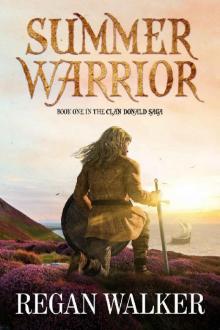 Summer Warrior (The Clan Donald Saga Book 1)
Summer Warrior (The Clan Donald Saga Book 1)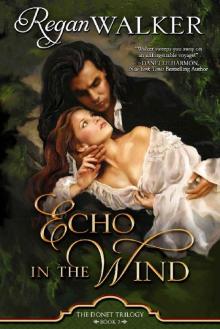 Echo in the Wind
Echo in the Wind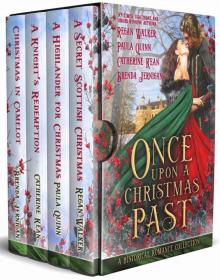 Once Upon a Christmas Past
Once Upon a Christmas Past A Secret Scottish Christmas (Agents of the Crown Book 4)
A Secret Scottish Christmas (Agents of the Crown Book 4)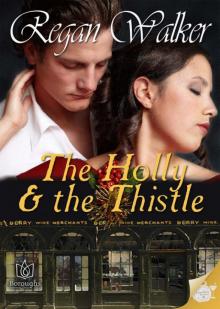 The Holly and the Thistle
The Holly and the Thistle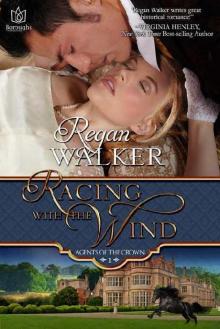 Racing with the Wind (Agents of the Crown)
Racing with the Wind (Agents of the Crown)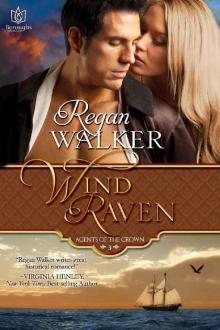 Wind Raven (Agents of the Crown)
Wind Raven (Agents of the Crown)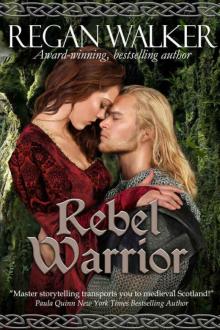 Rebel Warrior (Medieval Warriors #3)
Rebel Warrior (Medieval Warriors #3)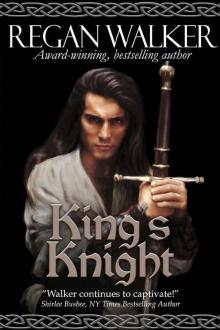 King's Knight (Medieval Warriors Book 4)
King's Knight (Medieval Warriors Book 4)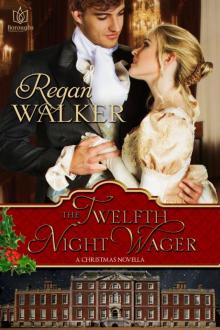 The Twelfth Night Wager
The Twelfth Night Wager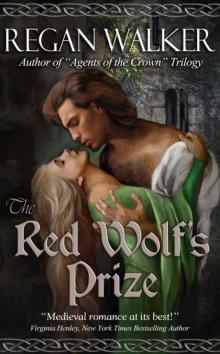 The Red Wolf's Prize
The Red Wolf's Prize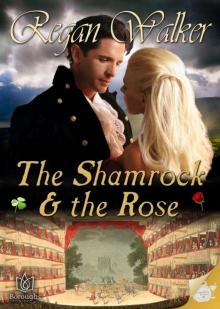 The Shamrock & the Rose
The Shamrock & the Rose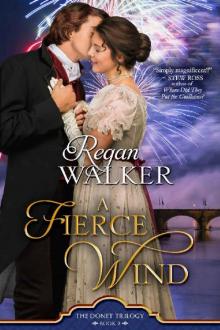 A Fierce Wind (Donet Trilogy Book 3)
A Fierce Wind (Donet Trilogy Book 3)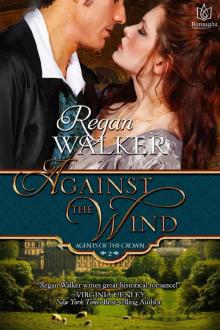 Against the Wind (Agents of the Crown Book 2)
Against the Wind (Agents of the Crown Book 2)